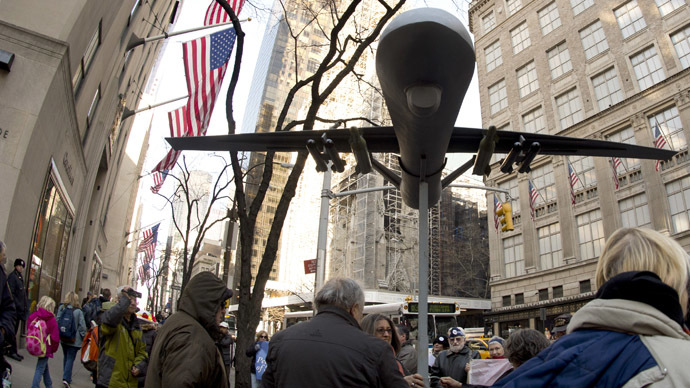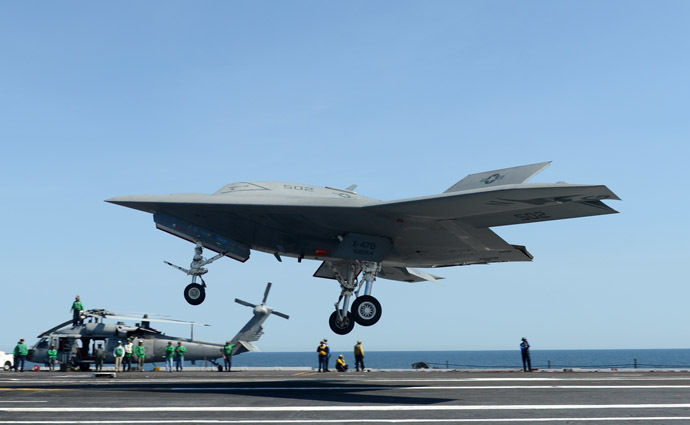US produced so many drones it will spy on friends and foes alike

Manufacturers in the US have produced so many drones that now the US government is in search of a place to use all these products, cofounder of globalexchange.org and author Medea Benjamin told RT.
RT:Does the US using drones in Afghanistan, Pakistan and Yemen mean it is shifting away from the region?
Medea Benjamin: I don’t think that so much that the US is shifting from Afghanistan, Pakistan and Yemen. I think, the US is adding more places for using the drones, particularly for the use of civilian drones and is expanding into other parts of Asia, into places around the Pacific as well as into Africa and potentially in South and Central America. It is almost like the US manufactures of drones have produced so many of these products that now the US government is in search of a place to use them. And of course that means that the US will be spying on friends and foes alike. Already the US is using the drones for civilian purposes in Iran and Northern Mali, in Turkey to support the Turkish government in its fight against the Kurdish rebels, so it’s an ever expanding empire of the United States, and ever expanding involvement in other countries internal conflicts.
RT:Do you think US drones program can really help it solve some issues in the region?
Medea Benjamin: I think, it is just stirring up more potential conflicts. The US has been setting up bases and places along the Pacific like in the Coco islands of Australia. The US is, I think, intimidating a number of other nations by the expansion into Asia and the Pacific. At a time when the United States should be doing just the opposite, should be cutting back from its expansionism that has been so disastrous in Iraq and Afghanistan, withdrawing troops from places it has over the globe and focusing on internal problems in US instead of stirring up new conflicts potentially with China.

RT:Leaked internal data produced by Pakistani officials documenting drone strikes on the ground revealed that at least 1 in 5 drone strike victims was confirmed as civilian. Is the anger in the countries where US practices drone strikes a real issue for the United States?
Medea Benjamin: Unfortunately the United States has been getting away with killing perhaps thousands of innocent people with drones, without the American people being aware of it and without any kind of transparency or accountability. The only places where this is more known are the countries where the drones are being used. And if you look at the case of Pakistan, you find tremendous opposition to the United States from these drones’ strikes. And the same is building up in Yemen, where I recently visited it and found, even though the President of Yemen condones the drone strikes and encourages the United States government to use drone strikes, the majority of people seem to be opposed to it, especially as they learn more. In fact, the national dialog conference, which is represented by 565 Yemenis were writing the New Constitution in the transition to democracy, have recently voted to call drone strikes in all kinds of extrajudicial killings illegal. So I think the US is already facing a lot of anger in the countries where it is using the drones and if starts spreading that, not only the anger will be directed at the governments of those countries but also at the United States government and the American people, which is bad for our national security.
RT:If we speak about the US military bases in Turkey, how does the presence of the US affects the domestic policy and internal security in Turkey and vice versa?
Medea Benjamin: Well, the US has used the base of Incirlik in Turkey to be the stationing of the drones and to use them inside Iraq to relay information to the Turkish government. Already we see that the US has relayed bad information to the Turkish government that resulted in one particular strike in the death of 34 civilians. I don’t think the US has any business getting involved in any conflict between the Kurds and the Turks. That is something that has no influence in internal security of the United States and it is just a provocation, and another example of the US inserting itself into other conflicts.
RT:But don’t you think that drones can do a lot for civil service?
Medea Benjamin: Well, firstly I think, it is too early to talk about that because the killing is still going on. The drone strikes have actually increased quite significantly in Afghanistan between 2011 and 2012 and we don’t yet have figures for 2013. And the drone strikes are continuing to kill people in Pakistan and Yemen. And I think it’s more business as usual as well as an expansion of drones for civilians’ purposes. But I worry when the US gets involved in civilians with US drones it could easily be a drawing into using legal drones. In fact the same predator and reaper drones that are being used for civilians are the same predator and reaper drones that are killing people in places like Pakistan and Yemen. So I think it is a slippery slope and very dangerous.
The statements, views and opinions expressed in this column are solely those of the author and do not necessarily represent those of RT.












